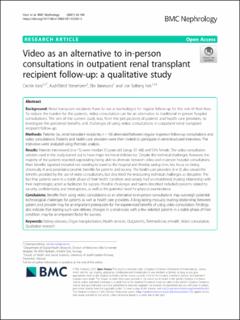| dc.contributor.author | Varsi, Cecilie | |
| dc.contributor.author | Stenehjem, Aud Eldrid | |
| dc.contributor.author | Børøsund, Elin | |
| dc.contributor.author | Solberg Nes, Lise | |
| dc.date.accessioned | 2022-01-20T14:01:12Z | |
| dc.date.available | 2022-01-20T14:01:12Z | |
| dc.date.created | 2021-07-07T13:27:53Z | |
| dc.date.issued | 2021 | |
| dc.identifier.citation | Varsi, C., Stenehjem, A.-E., Børøsund, E. & Solberg Nes, L. (2021). Video as an alternative to in-person consultations in outpatient renal transplant recipient follow-up: a qualitative study. BMC Nephrology, 22, Artikkel 105. | en_US |
| dc.identifier.issn | 1471-2369 | |
| dc.identifier.uri | https://hdl.handle.net/11250/2838520 | |
| dc.description.abstract | Background: Renal transplant recipients have to see a nephrologist for regular follow-up for the rest of their lives. To reduce the burden for the patients, video consultation can be an alternative to traditional in-person hospital consultations. The aim of the current study was, from the perspectives of patients and health care providers, to investigate the perceived benefits and challenges of using video consultations in outpatient renal transplant recipient follow-up.
Methods: Patients (i.e., renal transplant recipients; n = 18) alternated between regular in-person follow-up consultations and video consultations. Patients and health care providers were then invited to participate in semi-structured interviews. The interviews were analyzed using thematic analysis.
Results: Patients interviewed (n = 15) were median 53 years old (range 37–64) and 53% female. The video consultation solution used in the study turned out to have major technical deficiencies. Despite the technical challenges, however, the majority of the patients reported appreciating being able to alternate between video and in-person hospital consultations. Main benefits reported included not needing to travel to the hospital and thereby saving time, less focus on being chronically ill and potential economic benefits for patients and society. The health care providers (n = 3) also valued the benefits provided by the use of video consultations, but described the reoccurring technical challenges as disruptive. The fact that patients were in a stable phase of their health condition and already had an established, trusting relationship with their nephrologist, acted as facilitators for success. Possible challenges and harms described included concerns related to security, confidentiality and interruptions, as well as the potential need for physical examinations.
Conclusions: Benefits from using video consultations as an alternative to in-person consultations may outweigh potential technological challenges for patients as well as health care providers. A long-lasting mutually trusting relationship between patient and provider may be an important prerequisite for the experienced benefits of using video consultation. Findings also indicate that starting such care delivery changes in a small-scale, with a few selected patients in a stable phase of their condition, may be an important factor for success. | en_US |
| dc.language.iso | eng | en_US |
| dc.rights | Navngivelse 4.0 Internasjonal | * |
| dc.rights.uri | http://creativecommons.org/licenses/by/4.0/deed.no | * |
| dc.title | Video as an alternative to in-person consultations in outpatient renal transplant recipient follow-up: a qualitative study | en_US |
| dc.type | Peer reviewed | en_US |
| dc.type | Journal article | en_US |
| dc.description.version | publishedVersion | en_US |
| dc.rights.holder | © The Author(s), 2021. | en_US |
| dc.source.volume | 22 | en_US |
| dc.source.journal | BMC Nephrology | en_US |
| dc.identifier.doi | https://doi.org/10.1186/s12882-021-02284-3 | |
| dc.identifier.cristin | 1920716 | |
| dc.source.articlenumber | 105 | en_US |
| cristin.ispublished | true | |
| cristin.fulltext | original | |
| cristin.qualitycode | 1 | |

